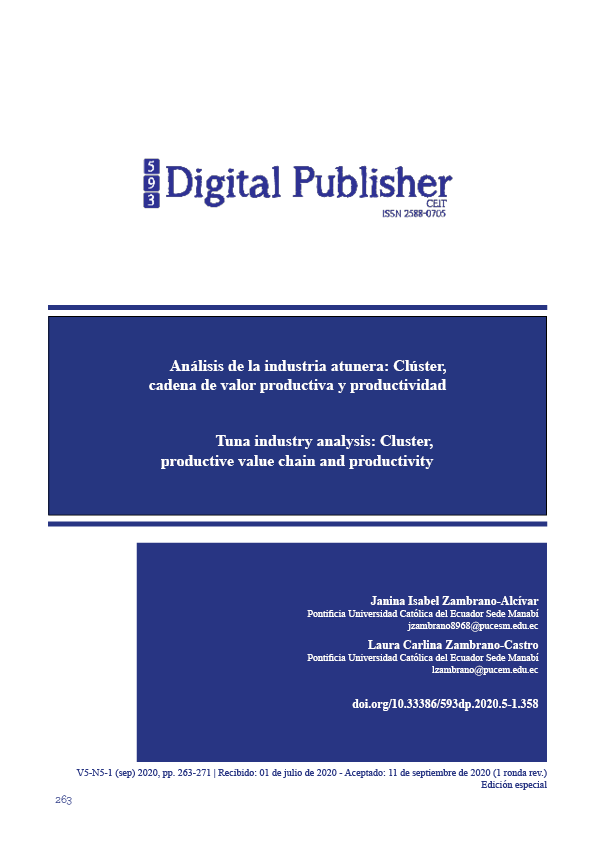Tuna industry analysis: Cluster, productive value chain and productivity
Main Article Content
Abstract
The tuna activity is consolidated as an important activity in the Ecuadorian industrial fishing sector, due to the generation of foreign exchange and sources of employment. This article aims to analyze the Ecuadorian tuna industry with respect to the cluster, productive value chain and productivity. The methodology used is descriptive with support in the documentary research technique; The study sample is limited to the provinces of Guayas, Manabí and Santa Elena because they concentrate 92% of the tuna industry in Ecuador. The dimensions of the cluster are based on Navarro (2003), the productive value chain in FAO (2013) and Torres (2016); the indicators of labor productivity and capital in Cobb-Douglas (1928). Research findings show that the tuna industry cluster has a vertical integration, offering primary and processed tuna products; the province of Guayas has strength in its cluster due to its level of labor productivity and capital compared to Manabí and Santa Elena; However, the deterioration in the productivity levels of the tuna industry due to external shocks and the effects of the informal economy, reflect a decrease in exports in 2019, reaching 31% for raw materials and 4% for manufactured products. Companies located in the province of Guayas and Santa Elena must give way to innovation to achieve better levels of productivity, while the province of Manabí must make adjustments in port issues; all changes must be considered from the perspective of a sustainable industry.
Downloads
Article Details
1. Derechos de autor
Las obras que se publican en 593 Digital Publisher CEIT están sujetas a los siguientes términos:
1.1. 593 Digital Publisher CEIT, conserva los derechos patrimoniales (copyright) de las obras publicadas, favorece y permite la reutilización de las mismas bajo la licencia Licencia Creative Commons 4.0 de Reconocimiento-NoComercial-CompartirIgual 4.0, por lo cual se pueden copiar, usar, difundir, transmitir y exponer públicamente, siempre que:
1.1.a. Se cite la autoría y fuente original de su publicación (revista, editorial, URL).
1.1.b. No se usen para fines comerciales u onerosos.
1.1.c. Se mencione la existencia y especificaciones de esta licencia de uso.
References
Barcia, A. (2017). El sector atunero y su importancia en las exportaciones del Ecuador periodo 2012-2016. Universidad de Guayaquil.
Cayeros, S., Robles, F., & Soto, E. (2016). Cadenas de valor y cadenas productivas. EDUCATECONCIENCIA., 10(11), 6-12.
Daw, T., Adger, N., & Brown, K. (2009). El cambio climático y la pesca de captura: Repercusiones potenciales, adaptación y mitigación. FAO.
FAO. (2013). A value-chain analysis of international fish trade and food security with an impact assessment of the small-scale sector. Food and Agriculture Organization of The United Nations.
González, M., & Figueroa, P. (2011). Sobre clústers, intangibles y competitividad: Reflexiones conceptuales y retos. 1, 41-74.
MCE. (2019). Informe sobre el sector atunero ecuatoriano. Ministerio de Comercio Exterior del Ecuador.
Merino, F. (2012). Firms’ internationalization and productivity growth. Research in economics, 66, 349-354.
Morgan, G., & Staples, D. (2006). The history of industrial marine fisheries in Southeast Asia. http://www.fao.org/3/ag122e/ag122e00.htm
Muñoz, M. (2012). Comunicación y productividad en pequeñas y medianas empresas de un cluster textil en Colombia. Contaduría y Administración, 57(2), 223-244.
Navarro, M. (2003). Análisis y políticas de clusters: Teoría y realidad. Ekonomiaz, 53(2), 14-49.
Paredes, L. (2019). Propuesta de un sistema de control de calidad en una empacadora de camarón para incrementar la productividad en el área de pelado. Universidad de Guayaquil.
Porter, M. (1998). Clusters and competition. New Agendas for Companies, Goverments and Institutions (Bilbao, pp. 197-287).
Presidencia del Ecuador. (2018). Reglamento sustitutivo para la regulación de los precios de los derivados de los hidrocarburos (N.o 500).
Rincón, H. (2001). Calidad, Productividad y Costos: Análisis de Relaciones entre estos Tres Conceptos. Actualidad Contable Faces, 4(4), 49-61.
Rohvein, C. (2013). Metodología de evaluación del nivel de competitividad de las PYMES. Revista Ciencias Estratégicas, 21(29), 49-68.
Torres, L. (2016). Diagnóstico de la cadena productiva de valor de la pesca ecuatoriana de atún en altamar 2012-2015. Universidad de Guayaquil.



